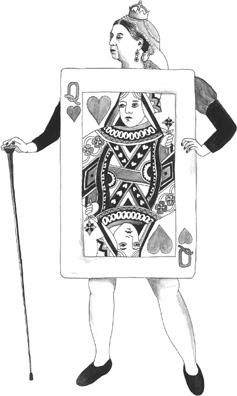
THE Queen of Hearts
She made some tarts,
All on a summer’s day;
The Knave of Hearts
He stole the tarts
And took them clean away.
The King of Hearts
Called for the tarts
And beat the Knave full sore;
The Knave of Hearts
Brought back the tarts
And vowed he’d steal no more.
The first known appearance of this rhyme in print is in 1782. Contrary to appearances, it isn’t about a kitchen theft, but tells a nursery-rhyme version of a game of cards. The Queen, Knave and King of Hearts are all cards, while the tarts are the winning points passed from player to player until the game is won.

But how we read this rhyme today is coloured by the interpretation of mathematician and keen card-player Lewis Carroll in his classic work Alice’s Adventures in Wonderland (1862). Backed up by John Tenniel’s equally influential illustrations – which immortalized Humpty Dumpty as an egg – she is clearly a caricature of Britain’s eccentric and autocratic monarch of the time, Queen Victoria, with elements of the real person to make her at once instantly recognizable to parents reading the story to their children, but fantastical enough to render her unrecognizable to children. In Alice in Wonderland, the King of Hearts (like Prince Albert) is meek and compliant, while his wife, the Queen of Hearts, is clearly very much in charge. But Carroll’s queen is also based on the history of the playing card itself. The original Queen of Hearts first emerged on a deck of playing cards produced in France in 1650, apparently inspired by the Old Testament figure of Judith. When all seemed lost for the Jewish people, this beautiful (if steely) woman had managed to take Holofernes, the evil Assyrian general, off guard and cut off his head.
In a mocking echo of the biblical story, Carroll’s queen is completely obsessed with decapitation: ‘The Queen had only one way of settling all difficulties, great or small. “Off with his head!” she said, without even looking round.’ During the trial of the Knave (for stealing the tarts), virtually every witness is in danger of losing his or her head, Alice included.